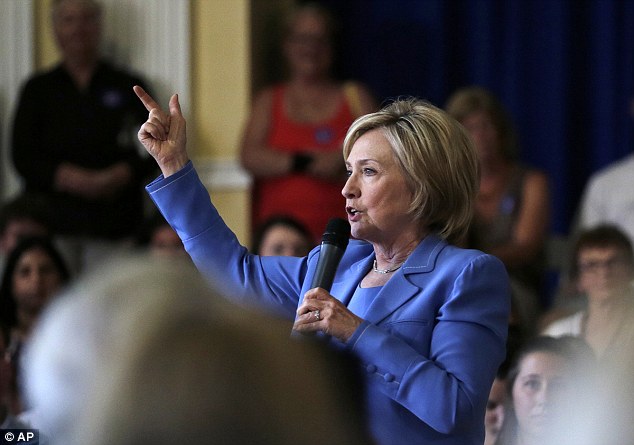Hillary Clinton proposes businesses that share profits with their employees receive 15% tax credits
- Clinton detailed the first component of her economic platform aimed at raising middle-class incomes at a town hall meeting in Dover
- It would be capped at a value of 10 percent of employees' wages
- The tax credit would be available only to firms that share profits widely with employees
Democratic U.S. presidential candidate Hillary Clinton announced a new plan to give businesses two-year tax credits for sharing profits with workers at a New Hampshire campaign stop Thursday.
Clinton detailed the first component of her economic platform aimed at raising middle-class incomes at a town hall meeting in Dover, citing local examples of businesses that share profits with employees.
'If you treat somebody like they have a stake in your business, they're going to stand up a little straighter, they're going to work a little harder,' said Clinton, the front-runner for the Democratic nomination ahead of the presidential election in November 2016.
Under Clinton's plan, firms would receive a two-year tax credit equal to 15 percent of the profits distributed to workers, capped at a value of 10 percent of employees' wages.
Scroll down for video

Clinton detailed the first component of her economic platform aimed at raising middle-class incomes at a town hall meeting in Dover
The tax credit would be available only to firms that share profits widely with employees, would phase out credits available for profits shared with high-income workers and end after two years when businesses that benefited from the credits would no longer need them, Clinton's campaign said.
If a firm provided a $5,000 profit-sharing payment to a worker earning $50,000 per year, for example, it would receive a $750 tax credit under the proposal.
The tax benefit available to any single firm in a given year would be capped to 'prevent an excessive credit for very large corporations,' the campaign said, emphasizing Clinton's focus on supporting small business.
Clinton's campaign estimated the cost of her 'Rising Incomes, Sharing Profits' tax credit would be between $10 billion to $20 billion over 10 years and could be paid for by closing tax loopholes that she will detail in coming weeks.
Roughly 40 percent of U.S. workers participate in profit-sharing plans and it has a meaningful impact on their wealth, according to economic research cited by Clinton's campaign.
'When companies share profits, not only do workers benefit, but the companies themselves see higher productivity,' said Alan Blinder, a Princeton University economics professor who is advising Clinton's campaign.
The profit-sharing proposal is the first piece of Clinton's economic agenda outlined in a Monday speech. She said that over the course of the summer she would explain how she would raise the hourly minimum wage, support collective bargaining, fight employer wage theft, encourage long-term investing and regulate Wall Street.

Face the nation: Democratic presidential candidate Hillary Clinton answers questions from reporters following a campaign town hall meeting in Dover, New Hampshire July 16, 2015
-
 Singer's hygiene pad falls from between her legs on live TV
Singer's hygiene pad falls from between her legs on live TV
-
 Mysterious tent erected outside Bobbi Kristina's hospice
Mysterious tent erected outside Bobbi Kristina's hospice
-
 Pat Houston makes late night visit to Bobbi Kristina in...
Pat Houston makes late night visit to Bobbi Kristina in...
-
 Smoke billows from Egyptian Mediterranean patrol ship hit by...
Smoke billows from Egyptian Mediterranean patrol ship hit by...
-
 Shocking moment child no older than 12 executes ISIS captive
Shocking moment child no older than 12 executes ISIS captive
-
 Surveillance footage shows moment of El Chapo's escape
Surveillance footage shows moment of El Chapo's escape
-
 13-year-old boy filmed being beaten to death in Bangladesh
13-year-old boy filmed being beaten to death in Bangladesh
-
 Bobbi Kristina with partner Nick Gordon back in 2012
Bobbi Kristina with partner Nick Gordon back in 2012
-
 Video reveals El Chapo's motorbike on rails and escape...
Video reveals El Chapo's motorbike on rails and escape...
-
 Dramatic moment drowning dog is saved by CPR in Florida
Dramatic moment drowning dog is saved by CPR in Florida
-
 Man invents drone that has the ability to fire a handgun
Man invents drone that has the ability to fire a handgun
-
 Angela Merkel is faced with weeping refugee girl on TV
Angela Merkel is faced with weeping refugee girl on TV
-
 EXCLUSIVE: Family members gather and wipe tears from their...
EXCLUSIVE: Family members gather and wipe tears from their...
-
 REVEALED: Caitlyn Jenner's reps 'demanded ESPYs award in...
REVEALED: Caitlyn Jenner's reps 'demanded ESPYs award in...
-
 'This life is short and bitter': How Chattanooga gunman...
'This life is short and bitter': How Chattanooga gunman...
-
 EXCLUSIVE: Holly Madison was a 'weirdo' who had such a...
EXCLUSIVE: Holly Madison was a 'weirdo' who had such a...
-
 'Trans people deserve something vital: your respect':...
'Trans people deserve something vital: your respect':...
-
 Terror on the high seas: Egyptian navy vessel erupts in huge...
Terror on the high seas: Egyptian navy vessel erupts in huge...
-
 It's not us, it's the Chinese! Iran's supreme leader mocks...
It's not us, it's the Chinese! Iran's supreme leader mocks...
-
 EXCLUSIVE: Father of girl having Louis Tomlinson's baby says...
EXCLUSIVE: Father of girl having Louis Tomlinson's baby says...
-
 Horrifying moment aggressive Arizona cop ‘illegally’ enters...
Horrifying moment aggressive Arizona cop ‘illegally’ enters...
-
 Secretive military operation 'Jade Helm' gets underway...
Secretive military operation 'Jade Helm' gets underway...
-
 Caitlyn Jenner's ESPY Courage Award win is SLAMMED by victim...
Caitlyn Jenner's ESPY Courage Award win is SLAMMED by victim...
-
 The beauty queen wife of El Chapo and the OTHER beasts in...
The beauty queen wife of El Chapo and the OTHER beasts in...




















































































































































































































































































































![Link to Feature: http://www.interviewmagazine.com/music/justin-bieber-1/\n \nOn his Met Gala Date:\nSTEWART: You just went to the Met Ball. How was that?\nBIEBER: It was awesome. We got to see a lot of great people.\nSTEWART: Did you have a date?\nBIEBER: I didn¿t have a date. But I got to talk to Anna Wintour for quite a few minutes. We talked about fashion, and I thanked her for inviting me, because you have to be invited to the event. I know they use a pretty small list, so to be in that room with a lot of awesome people ...\nSTEWART: Do you remember who the designer of your beautiful jacket was?\nBIEBER: It was Balmain. And, actually, I guess I did have a date. It wasn¿t a girl; my date was Olivier [Rousteing], who¿s the designer at Balmain.\nSTEWART: Oh, it was Olivier. I was hoping that you would ask me to be your date. [both laugh]\nBIEBER: Well, I would have.\nSTEWART: I would¿ve worn my Balmain dress. But, anyway, you looked great.\n \nOn Scooter Braun:\nSTEWART: And how did](http://web.archive.org/web/20150717055353im_/http://i.dailymail.co.uk/i/pix/2015/07/15/15/2A8EB55000000578-0-image-m-16_1436971664744.jpg)




























